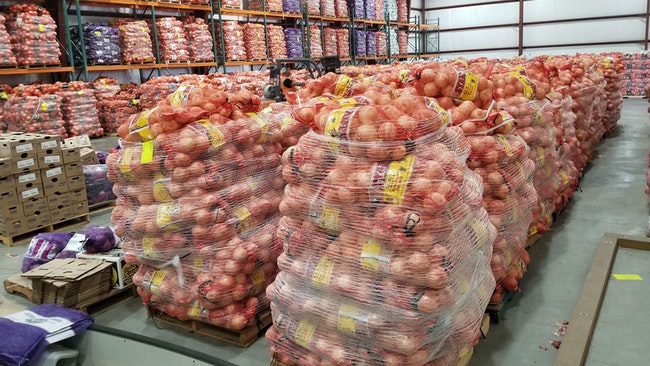
The local onion industry was hit hard by the COVID-19 virus outbreak as restrictions across the nation cut off supply chains and scuttled prices. Now, leading producers want assistance from the federal government. (The Enterprise/File).
NOTE: The Enterprise is providing free access to its content related to the coronavirus as a community service. Subscriptions at $5 a month help the Enterprise keep this up.
ONTARIO – As the nationwide onion market continues to collapse, area producers are turning to the federal government to survive.
The government has a relief plan – the Coronavirus Food Assistance Program – that will furnish $16 billion in help to farmers. Of that, $2.1 billion is to help producers cover losses for specialty crops such as onions.
Onions are Malheur County’s biggest economic sector with a crop value of $80 million annually.
Under the program, producers can receive up to $125,000 for one specialty crop and up to $250,000 if they suffer losses with two specialty crops.
The money, though, probably won’t be enough for most onion producers, said Grant Kitamura, managing partner and chief executive officer of Baker & Murakami Produce Company, an onion packing firm in Ontario.
“Even if everyone got what they applied for, it wouldn’t cover the losses,” said Kitamura.
Paul Skeen, president of the Malheur County Onion Growers Association, said the $2.1 billion to overcome losses across the U.S. “isn’t going to go very far.”
He said onion producers want the federal government to raise the ceiling on individual loss qualifications above $125,000, provide more assistance in the fall when harvest is in full swing and limit imports of onions from places like Mexico and Canada.
“This is hitting everybody. They’re dumping lettuce, cabbage, cucumbers,” he said.
In a statement Friday, U.S. Rep. Greg Walden, R-Hood River, said he is concerned about the limits on aid.
“Onion producers from across Oregon have told me how the proposed program’s limitations in payments for an individual crop fail to reflect the high costs and value of their crops and would make it a challenge to meet the losses they are experiencing,” he said.
Walden said he “recently wrote to President Trump expressing my concerns with the proposed limitations and encouraging the administration to provide more flexibility so the program meets the diverse structures and costs of Oregon’s family farms.”
The prospects for the area onion industry are growing dire.
An April 17 letter to Sonny Perdue, U.S. agriculture secretary penned by Skeen, Dell Winegar, president of the Idaho Onion Growers Association and Brad Watson, president of the Idaho-Oregon Fruit and Vegetable Association, asserted business has dropped significantly.
“The few onions that are being sold are being sold at a loss. Idaho and Eastern Oregon onion customers have reported reductions in business up to as much as 95%,” they wrote.
Another challenge for local onion farmers is the type of onion grown. Local farmers tend to grow larger onions used by the food service industry and processing plants.
“With the mandatory closure of most eating establishments, the closure of schools, and so many other things, the foodservice and processing segment of the onion industry has come to a virtual stop,” said the letter.
The letter said that “one shipper reported they will be dumping 5% of their overall production or about 50,000 50 (pound) bags or approximately 63 semi loads of onions.”
Skeen said the food service market is “the name of our game.”
“And this isn’t over. We’ve got 15,000 to 20,000 acres (of onions) planted. We are going to need help this fall,” said Skeen.
Skeen said he isn’t optimistic.
“We are hoping by the first of August things will have snapped back. I don’t want to be a doomsday sayer, but I think as fast as it went down, it won’t come back that fast,” said Skeen.
Kitamura said shipments of storage onions – from the 2019 crop – are up but prices remain stagnate.
“Some states that are opening up are buying, food service people there are buying onions. But they must fill the channels. No one has any inventory,” said Kitamura.
Kitmura said the letter to Perdue is a way to make sure the federal government “doesn’t forget about us.”
News tip? Contact reporter Pat Caldwell at [email protected].




